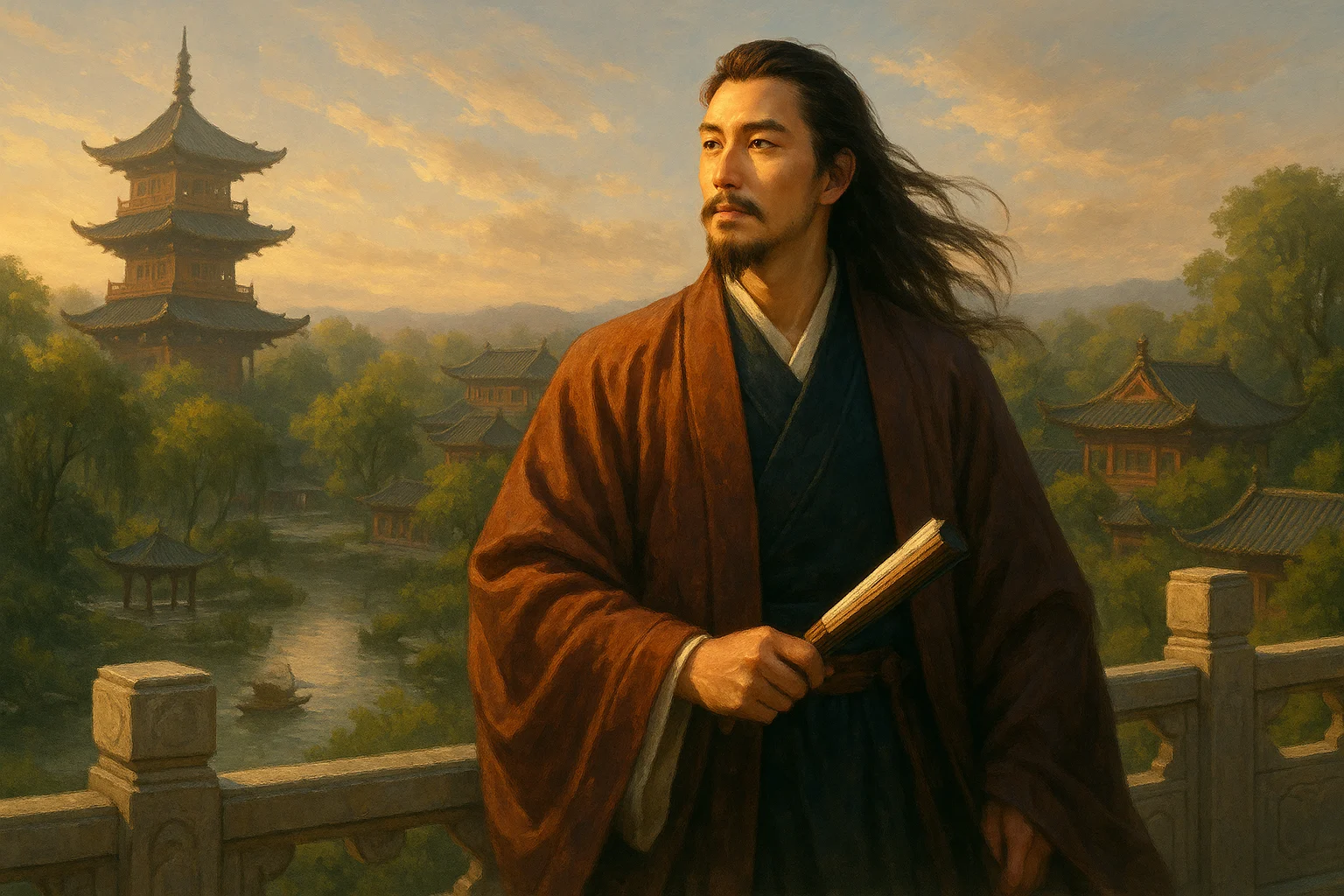Mountains cradle the flat-arched bridge,
Soft-blue water braids floral threads.
A few thatched huts with windows trim—
No dust arrives,
Spring wind's broom sweeps all overheads.
Noontime nap wakes to birdsong speech,
Pillowed, I hear dawn's phantom crow.
Old friends surface—now all aged—
Greedy for dreams,
The Handan path fades in sleep's glow.
Original Poem
「渔家傲 · 平岸小桥千嶂抱」
平岸小桥千嶂抱,柔蓝一水萦花草。
茅屋数间窗窈窕。
尘不到,时时自有春风扫。午枕觉来闻语鸟,欹眠似听朝鸡早。
王安石
忽忆故人今总老。
贪梦好,茫然忘了邯郸道。
Interpretation
Composed around 1086 after Wang Anshi's resignation as chancellor, this ci poem reflects his semi-reclusive life in Jinling's Zhongshan Mountains. Having weathered political storms and controversial reforms, the elder statesman turned to nature, cultivating a poetic style of crystalline serenity. This work captures a moment between afternoon dreams and birdsong—a pivot from worldly ambition to natural harmony, where philosophical awakening blossoms through landscape vignettes.
First Stanza: "平岸小桥千嶂抱,柔蓝一水萦花草。茅屋数间窗窈窕。尘不到,时时自有春风扫。"
Píng àn xiǎo qiáo qiān zhàng bào, róu lán yī shuǐ yíng huā cǎo. Máo wū shù jiān chuāng yǎo tiǎo. Chén bú dào, shí shí zì yǒu chūn fēng sǎo.
Flat shores—a small bridge embraced by thousand-fold peaks,
a tender-blue stream lingers round flowers and grass.
Thatched huts with windows of quiet grace.
No dust arrives here,
only the spring wind's constant sweeping.
The opening landscape unfolds like an ink-wash scroll. "Thousand-fold peaks" (千嶂) establish protective grandeur, while "tender-blue" (柔蓝) dyes the stream with liquid serenity—its meandering ("lingers") embodying nature's unhurried rhythm. The "windows of quiet grace" (窗窈窕) mirror the poet's contemplative mind, their depth contrasting with the thatched huts' rustic simplicity. The closing couplet seals this sanctuary: "no dust" (尘不到) rejects worldly grime both literal and metaphorical, while the wind's "constant sweeping" suggests nature's self-purifying harmony.
Second Stanza: "午枕觉来闻语鸟,欹眠似听朝鸡早。忽忆故人今总老。贪梦好,茫然忘了邯郸道。"
Wǔ zhěn jué lái wén yǔ niǎo, yī mián sì tīng cháo jī zǎo. Hū yì gù rén jīn zǒng lǎo. Tān mèng hǎo, máng rán wàng le Hán dān dào.
Awakening from noon dreams to birds' conversation,
reclining, I almost hear dawn's court-summoning cockcrow.
Suddenly remembering old friends—all aged now.
Greedy for sweet dreams,
I've utterly forgotten Handan's phantom road.
The stanza pivots on sensory illusions. Birdsong (语鸟)—nature's benign chatter—morphs into the remembered "cockcrow" (朝鸡) of bureaucratic life, its aural echo underscoring how past obligations haunt present tranquility. The abrupt "all aged now" (今总老) telescopes time, contrasting the poet's timeless mountain refuge with his generation's mortality. The final couplet resolves this tension through Daoist detachment: "sweet dreams" (贪梦好) of reclusion eclipse the "phantom road" (邯郸道) of political ambition, referencing the Tang fable where a youth's dream of glory evaporates with millet-cooking steam—Wang's definitive renunciation of his reformer persona.
Holistic Appreciation
This poem depicts a serene and secluded scene, conveying Wang Anshi's tranquil and contented life in his later years after retirement. Through imagery like "low banks embraced by small bridges" and "a soft blue stream winding through flowers and grass", the poem constructs an elegant and expansive landscape painting. Lines such as "waking from an afternoon nap" and "lying askew as if hearing the morning rooster" seamlessly blend scenery with emotion, merging reality with memory, dreams with wakefulness, reflecting the poet's introspection and resolution regarding his past political career. The fusion of emotion and scenery, interweaving of the real and the illusory, makes the entire poem resemble a casually yet masterfully painted literati scroll, brimming with profound charm.
The poem expresses both joy in his reclusive life and reminiscences of bygone days. The poet does not completely detach from emotions but transcends them with ease. Between dreams and wakefulness, he reflects on the past through memories and mirrors reality through dreams, completing a psychological transition from engagement with the world to withdrawal, from glory and disgrace to tranquility. This "unforced yet flavorful" expression makes this poem a rare gem among Wang Anshi's later works.
Artistic Merits
- Fresh and Pictorial, Exquisite Composition
Lines like "low banks embraced by small bridges, a soft blue stream winding through flowers and grass" are highly visual, depicting scenery with natural charm, akin to the "light crimson landscapes" (浅绛山水) in traditional Chinese painting—elegant and ethereal in conception. - Fusion of Scene and Emotion, Dreams Linking Reality
Using "afternoon nap" as a thread, the poem connects the upper and lower stanzas, organically stringing together dreams and reality, memory and the present, forming an internally unified psychological and artistic structure. - Skillful Allusions, Profound Meaning
The concluding allusion to "the road to Handan" (邯郸道) evokes reflection on and release from past political life, lending the poem philosophical depth and elevating its emotional layers. - Natural Language, Deep and Subtle Sentiment
The poem's language appears casually composed yet is rich in rhythm and delicate beauty, reflecting the maturity and ease of Wang Anshi's late poetic style.
Insights
This poem conveys the wisdom of "retiring to nature after achieving one's goals." Wang Anshi once devoted himself to state affairs and implemented new policies, aiming to benefit the world. Yet in his later years, after retreating into seclusion, he could joyfully accompany nature and view fame and gain with detachment. In today's increasingly hectic life, this poem reminds us: amidst the bustle and浮躁 of modern life, we should also preserve a "soft blue stream"—a pure spiritual refuge. Only after the clamor subsides can we learn to coexist with ourselves and rely on nature, truly experiencing the freedom and tranquility of "dust cannot reach" (尘不到).
About the Poet

Wang Anshi (王安石 1021 - 1086), a native of Linchuan in Jiangxi, was an outstanding statesman, writer, and thinker of the Northern Song Dynasty, counted among the "Eight Great Prose Masters of the Tang and Song Dynasties." His poetic achievements were particularly profound—his early works, filled with heroic language, revealed the ambition of a reformer. Though his ci poetry was few in number, it pioneered new realms of historical reflection. His poetry and prose combined intellectual depth with artistic value, and the over 1,500 works preserved in The Collected Works of Linchuan stand as a monumental testament to literary innovation in Song Dynasty literature.












